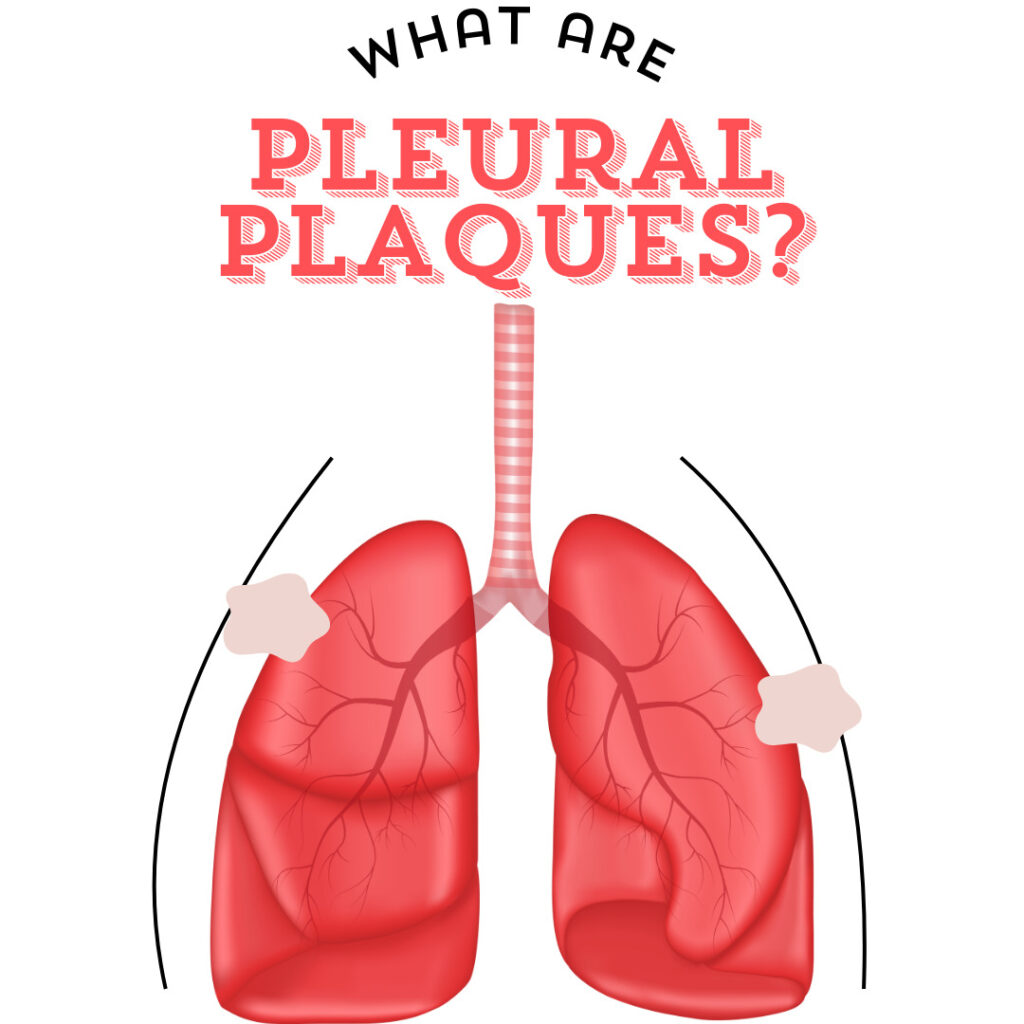Key takeaways: Pleural plaques are benign collagen growths that form in response to ingested asbestos fibers. There are no treatment plans associated with plaques, except for managing the pain that occasionally accompanies them. There are discrepancies about whether or not plaques might contribute to a mesothelioma diagnosis, but it seems that mesothelioma is mostly contingent upon genetic and immune factors—not the presence (or absence) of pleural plaques.

What is a Pleural Plaque?
A pleural plaque is a collagen-based mass that develops in the pleura—the space around the lungs, abdomen, or heart—in response to ingested asbestos. Pleural plaques are the most common bodily response to asbestos: the immune system, having been chronically irritated by the asbestos fibers, seeks to isolate the fibers. When a sample of a plaque is observed under a microscope, one would expect to find collagen fibers—no cells or blood vessels—and asbestos fibers.
By nature, pleural plaques are benign, or non-cancerous. While they might lead to discomfort, like impaired breathing or chest pain, they don’t pose the same serious risks associated with a mesothelioma diagnosis. Like asbestosis, though, pleural plaques are caused by asbestos exposure. People’s bodies have different reactions to asbestos—largely depending on genetics and environmental factors—but the mechanisms that result in such different responses aren’t yet largely understood. Once scientists understand the difference between a “plaque response” and “mesothelioma response,” they might be able to alter people’s immune responses, especially if they’ve been exposed to asbestos.
Pleural plaques are diagnosed in similar ways to mesothelioma: X-ray, CT scan, and even biopsy.
After pleural plaques are diagnosed, there usually isn’t any treatment or intervention. Doctors might suggest some treatments, like physical therapy, for the sake of easing the discomfort associated with plaques. Besides pain-targeting treatments, though, plaques don’t get removed or treated otherwise.
Do Pleural Plaques Lead to Mesothelioma?
Although plaques themselves are benign, there isn’t a consensus about their possible contribution to a mesothelioma diagnosis. Some studies claim that the plaques might be an “independent risk factor” for developing mesothelioma, beyond asbestos exposure. So, this means that some researchers establish the chronic irritation inflicted by plaques as something that can cause mesothelioma. In one study (2013), researchers followed patients with plaques over a span of several years. 17 of the patients developed mesothelioma, which according to statistical analysis, was significant enough to establish an association.
Another study (2020) found that a regulatory gene, IL1B, factored into whether patients developed pleural plaques or mesothelioma, but didn’t establish a causatory “plaques cause mesothelioma.” Like mentioned above, patients’ genetic, epigenetic, and environmental milieus seem to contribute most to whether or not they’ll develop mesothelioma. Genetic differences in immune function and regulation seem to be a bigger “risk factor” than plaques, even though plaques might be an independent risk factor. Because of research ambiguity—and considering that patients with plaques have already been exposed to asbestos, which is causally related to mesothelioma—there isn’t clarity on the relationship between plaques and mesothelioma. It’s safe to assume that genetics play a greater role in mesothelioma development than plaques do. Because some patients exposed to asbestos only develop benign plaques, their genetic and immune mechanisms might shed light on the development (or non-development) of mesothelioma. In turn, these mechanisms could serve as a target for new therapies for mesothelioma.
If you or a loved one has been diagnosed with mesothelioma or another asbestos-related disease, please call 1 (800)-505-6000 or fill out our form. We are here to help you navigate the legal process of filing a claim to receive compensation for your mesothelioma diagnosis. We help mesothelioma victims and their families in Pennsylvania.
Sources:
https://sciendo.com/article/10.2478/raon-2020-0057
https://academic.oup.com/jnci/article/105/4/293/925337
https://www.sciencedirect.com/topics/medicine-and-dentistry/pleura-plaque
